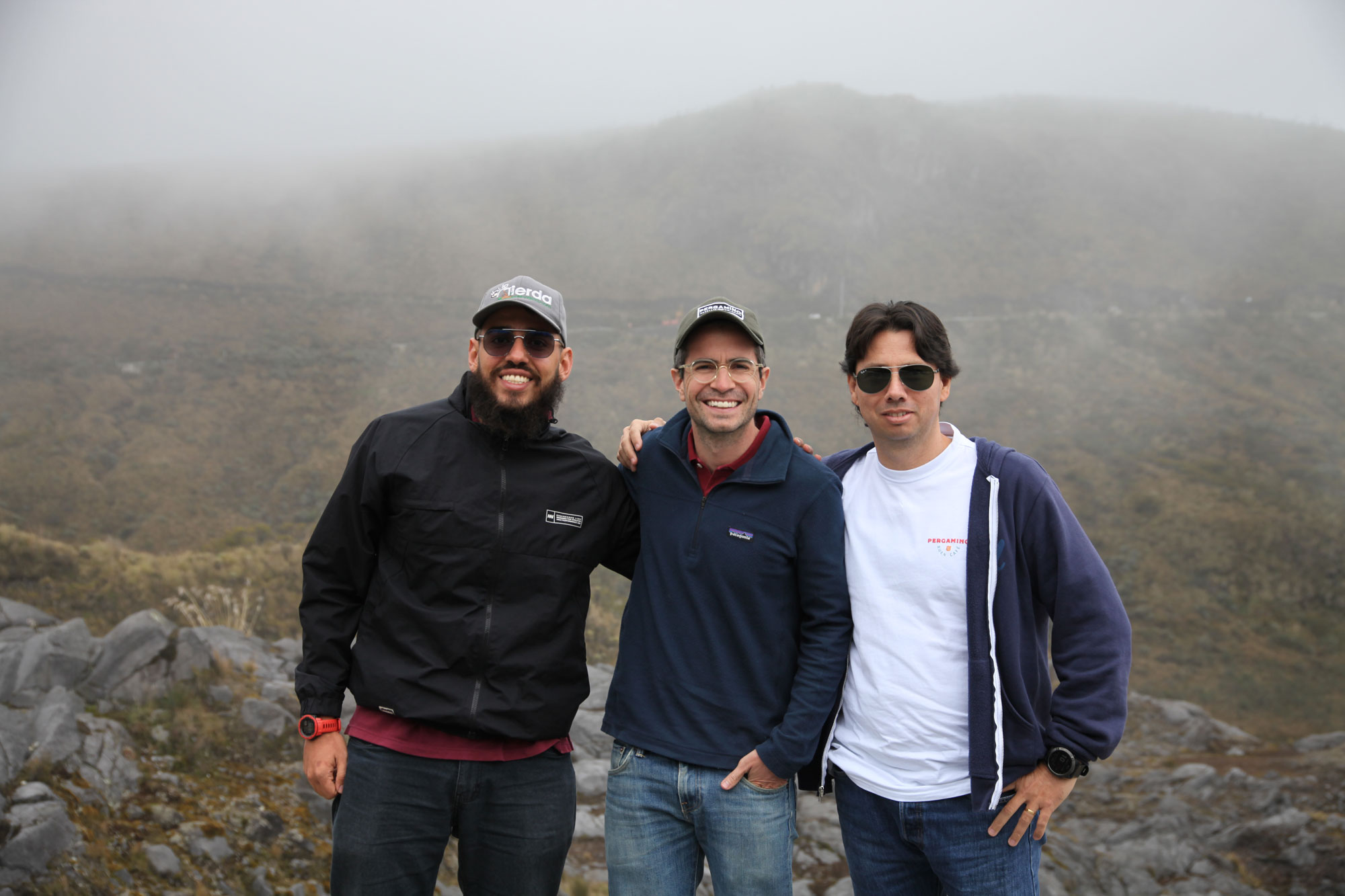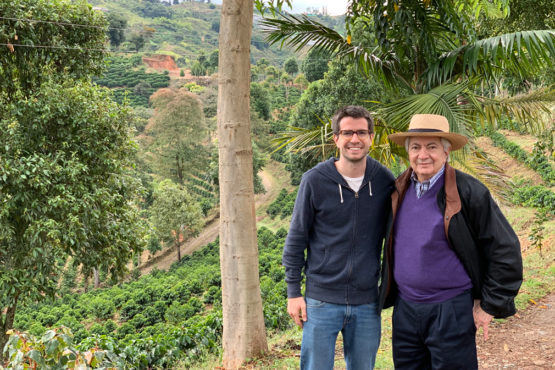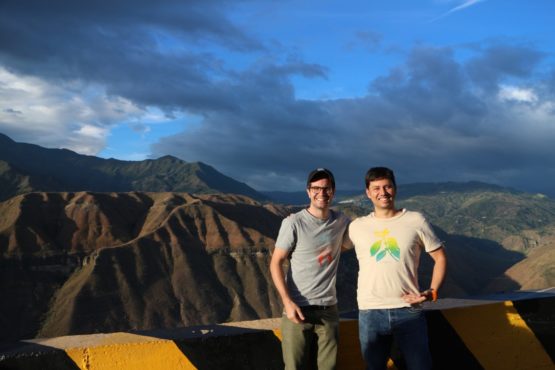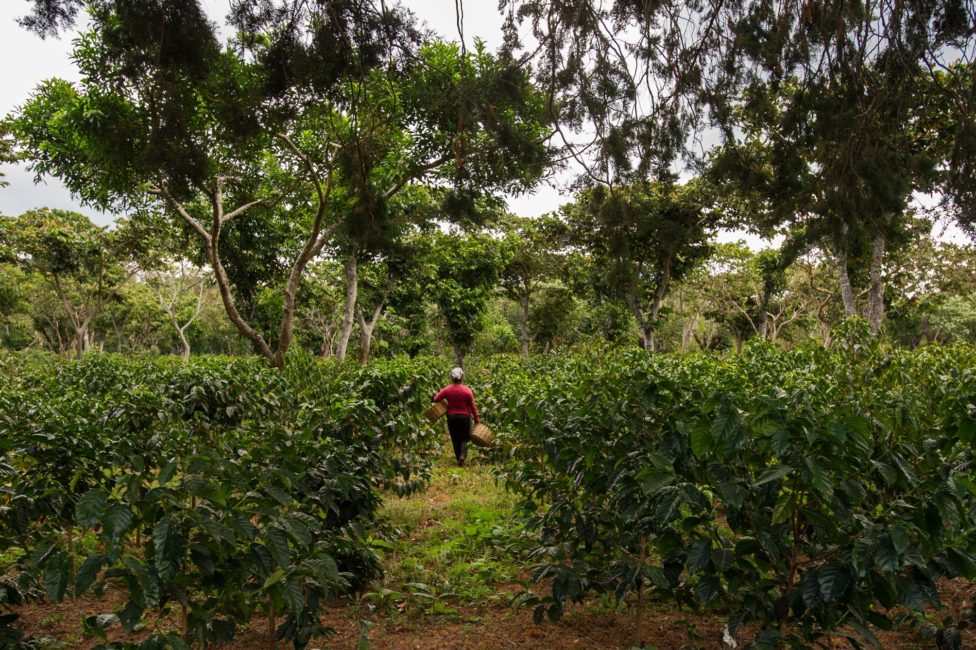Meet Pergamino
In Colombia, we are proud to partner with Pergamino, a progressive, family-owned company, dedicated to producing, sourcing and exporting exceptional Colombian coffee.
Pergamino is a constant source of inspiration for us at MCM, and we are proud to call them partners. The company was founded four decades ago, and today is headed up by Pedro Echavarria Jr. and Léonardo Henao Triana (pictured above, alongside Juan Henao on the left, who supports farmers on the field), a passionate, innovative and hard-working duo, who have incredible local and international knowledge of coffee production and trade.
Pergamino exports some of the very best coffees from Colombia. In addition to producing exquisite coffee on their own estates, the Pergamino team have created an Allied Producer Program which is dedicated to uncovering and commercialising specialty coffee in areas of Colombia that have historically had little access to specialty buyers, like MCM, who pay good premiums for high-quality coffees. Pergamino’s pioneering approach has allowed us to connect with some extremely dedicated and quality-focused smallholder producers and to start to build long term and mutually beneficial relationships with them.
HISTORY OF PERGAMINO
Pergamino is the milling and exporting arm of a wider company called Santa Barbara Estate, which is owned and operated by the Echavarria family.
Santa Barbara Estate was founded by Sr. Pedro Echavarria in the 1970s, when he purchased a small, abandoned farm in his home state of Antioquia, in the north-west of Colombia. Pedro Sr. recognised from the start that selecting the right location for his farms was critical and, for this reason, he chose to grow coffee high up in the Andes in the Antioquia region, which had the perfect conditions to produce exceptional coffee, with a unique microclimate, rich volcanic soil and high elevations. His life-long passion for coffee developed quickly and the estate shortly expanded to the small town of Santa Barbara, from which his company takes its name. By marrying hard work, precision and efficiency with ideal coffee-producing conditions, Pedro Sr. was able to quickly grow both the area under cultivation and his reputation as a coffee producer.
After completing college at Tufts University in Boston – where he studied political science and economics – Pedro Jr. returned to Colombia and became deeply involved in the workings of the family farm and its other enterprises. Initially, Santa Barbara operated solely as coffee growers, selling commercial-grade parchment to commodity buyers via the Colombian National Federation of Coffee Growers (or FNC). The family decided to start independently dry milling and exporting their coffee after growing frustrated with the lack of oversight on where and how it was being sold and the lack of control over the prices they could demand. Pedro was central in developing Pergamino, which started exporting in 2010. The family also runs a popular roastery and several cafés throughout the capital of Antioquia, Medellin, also operating as Pergamino.
Léo was Pergamino’s first employee outside of the family and was hired as an export and logistics expert. He joined the company with many existing connections to smallholder producers through his previous work, both as an exporter and a coffee grower himself. As Pergamino began to independently export Santa Barbara’s coffees, Léo was approached by many of these farmers asking him to also export and market their coffees on their behalf, with the hope of accessing specialty buyers who pay quality-based premiums and increasing transparency on how and where their coffee was being sold. Realising many farmers were facing the same difficulties and frustration that they had at Santa Barbara, Pedro and Léo decided to do something to help alleviate these challenges. In pursuit of this goal, the Allied Producer Program was established in 2013.
“For me, coffee is more than a beverage. Coffee is the link between different cultures that, maybe, they will never meet otherwise. Coffee is the bridge between the final consumers and the growers.” – Léonardo Henao Triana
Seven years on, almost 80% of what Pergamino exports is sourced through the program, which now operates in five different regions of Colombia – Antioquia, Cauca, Tolima, Nariño and Huila. Pergamino works on the premise that the specialty coffee market is a much more stable and profitable business than the commodity market, and that to encourage specialty production you must have access to a specialty buyer. The team actively works to support coffee producers in remote areas – many of whom would have been severely affected by violent clashes between illegal drug cartels, rebels and paramilitary groups until very recently – that have potential for excellent quality, but that have not historically had access to the specialty market. The program connects smallholder farmers to buyers who are willing to pay high premiums for great coffee, thereby incentivising quality and improving the livelihood of the coffee-producing communities.
After visiting a smallholder farmer’s home, where we observed bullet holes in the walls of the house, Léo reflects: “You heard the story of the growers who were growing poppy seeds (to sell to drug cartels) and now they are growing coffee. So, we are part of the transformation of society in a good way.”
HOW THE ALLIED PRODUCER PROGRAM WORKS
Pedro’s philosophy is simple; “Farmers don’t need more advice, they just need good prices for their coffee.” His view is that many smallholder farmers in Colombia already know what best farming and processing practices are, but don’t necessarily have the capital to invest into their farm to achieve those practices. Pergamino’s goal is to secure farmers the highest price for their coffee and to get as much of that amount back into the farmers hands, to do with what they choose. To maximise the profit they can make on the coffee Pergamino has chosen not to invest in expensive agronomy or social programs. Instead the team works closely with influential members of the producing communities and visits each region regularly to develop and maintain strong relationships at farm level. Pedro and Léo – who besides being an agronomist is also completing his Masters’ degree in fermentation processing at the National University’s Medellin branch – give on the ground advice and insights during farm visits and via local team members.
Pedro has found the most efficient model for the Allied Producer Program is to employ a local logistics officer in each region, who has close ties to the producing community and can help Pergamino connect to farmers. The logistics officers operate small warehouses or delivery points where coffee is received and undergoes initial assessment. During harvest, the farmers deliver small lots (around 100-150kg) of dried parchment to the delivery point every 2-3 weeks. A sample of the dried parchment is then milled and assessed for physical attributes, including uniformity of size, presence of defects, moisture content and seed to hull ratio. If the coffee passes the physical assessment it is accepted and the farmer receives their first payment for the coffee, calculated by the weight delivered and a base rate (significantly higher than the commercial rate) related to the physical quality of the parchment.
The coffee is then cupped and assessed for sensory attributes. After being accepted by the local QC team the coffees are transported to Pergamino’s QC lab in Medellin, where they are further assessed by an expert team of cuppers. Each lot is carefully evaluated and, based on the cup score and profile, the coffee is sorted into different grades of quality and combined into exportable sized lots. Feedback on each lot is relayed back to the producer and after it has sold a second payment is made to the producer according to premium the coffee attracted. Second payments are awarded to farmers during a “Premium Ceremony”, which also serve as a great way to gather farmers together and offer advice and insights and answer any questions the producers may have.
Through their work with the Allied Producer Program, Pedro and Léo have drawn great inspiration from the smallholder farmers they work with, who have influenced both the varieties they have chosen to plant at Santa Barbara Estate and the processing techniques they use. By roasting, serving and promoting coffees via their Medellin cafes, the team has also been instrumental in showcasing and celebrating the incredible quality, complexity and variety of Colombian coffee – produced both at the Santa Barbara Estates and further afield – to a wider audience.
We’re proud to represent Pergamino’s coffees here in Australia and to support the team in their pursuit of a sustainable supply chain for Colombian smallholder producers. To read more about Colombia, and how we source, head to our origin page.




